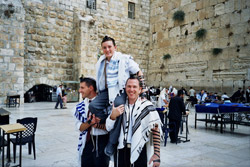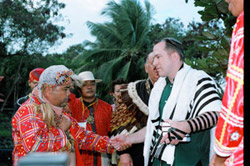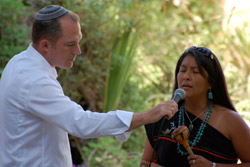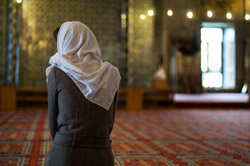Jesus Movements
Discovering Biblical Faith in the Most Unexpected Places

There is a growing phenomenon taking place concurrently within at least every sizeable region of the world today. People within numerous different tribal cultures and also people within the cultures of each of the major world religions are increasingly accepting Jesus without converting to Christianity and without joining churches. They are encountering Jesus in ways that change their lives forever, without them leaving one group for another. They are learning to discover for themselves what it means to be faithful to Jesus within their own cultures and within their own birth communities. Conversion for them is believed to be a matter of the heart and not one of joining a different, competing cultural community.

It is usually the case that after a number of these individuals within the same community are following Jesus, they begin meeting regularly as a small group. Over time this expands into multiple small groups among the same people group or within the same country. Eventually, it becomes established as a full-fledged movement of believers in Jesus that is outside of Christendom. It becomes a Jesus movement within another tradition. Does this mean they are living their lives outside the boundaries of biblical faith? Or, are they merely living beyond the boundaries of Christendom as a competing community?
How did Jesus live as a son of Israel? Did he create a separate and competing community from the one that was already there? Did he tell people to leave their synagogues? Did he start his own synagogues? Didn’t he seek to bring transformation and new life to the community that was already there?
The first followers of Jesus did not leave their synagogues. They began meeting regularly in small groups for fellowship, study, and prayer centered around Jesus while remaining part of the synagogues they were already in. These small group meetings were not under the auspices of the wider community; yet, the people within them remained relationally and culturally loyal to their wider community. Some new customs and expressions of prayer and music developed among the followers of Jesus, but these were practiced in addition to, not in place of, established Jewish traditions. There were a number of circumstances that led to the above dynamics changing, but this was the original model.

Jewish believers in the first century faced the Roman occupation, the acceleration of Jewish exile, the increasing threat of assimilation of Jews among the Gentiles, and growing numbers of non-Jews embracing new covenant faith. These circumstances led to Jewish followers of Jesus being both pushed out and pulled out of the traditional Jewish community. Two thousand years later, Jews in Israel today finally have the conditions necessary to be able once again to confidently and wholeheartedly accept Jesus as Israel’s Messiah while remaining firmly within the traditional synagogue community.
This is not a reference to what is called the Messianic Jewish movement. This is referring to a growing phenomenon of Jews following Jesus within Judaism. Increasing numbers of Jews are learning to follow Jesus faithfully within their traditional synagogue communities. Upon accepting Jesus, they begin meeting regularly in small groups for fellowship centered on Jesus while remaining loyal members of their synagogue communities.
The meetings of these small groups usually take place mid-week, as each family already prays in their respective synagogue on the Sabbath. When they come together as devotees of Jesus, they seek to avoid duplicating or replacing activities or traditions which they are already upholding in the synagogue. With each of them engaged congregationally in synagogues, most of the dimensions of congregational life are already fulfilled there. Some of the mid-week small group meetings are separate for men and women, as this has been found to be more intimate and more helpful in their lives. These meetings often operate similar to a talking circle which is more like a support group than a formal congregation. There is an intimate time of discussion and prayer explicitly centered around Jesus, and everyone in the circle participates.

Involvement in these small groups connects each of these believers to the worldwide community of new covenant faith, which Christians call the Church or the Body of Christ. Yet, members of these groups have neither converted to Christianity nor joined a church, nor even joined the Messianic Jewish movement which has its own structures and organizational agendas. Also, being spiritually connected to the much larger worldwide community of believers in Jesus does not replace their membership or service in their local synagogue community. They simultaneously have larger and smaller group relationships that obligate them to overlapping responsibilities and also to other responsibilities which are unique and different to each group.
Relational faithfulness within this dynamic is not a zero-sum game of all or nothing on one side or the other. These believers are faithful to Jesus and are also faithful in their relationships within their birth community of faith. They are not undermining the pre-existing community and especially not creating a new separate and competing community. They seek to bring transformation and new life to what is already there, serving from within.
A Jewish Emissary of Jesus
I am a Jewish Israeli who follows Jesus. When I was growing up, my family accepted Jesus. As a teenage boy, I became convinced that there was a calling on my life to go to many nations with the message of Jesus. For most of my life since then, I have lived out two parallel journeys. One journey has been discovering and learning by experience how to follow Jesus as a Jewish Israeli. The other journey has been discovering and learning by experience how to take the message of Jesus from Jerusalem out to the nations of the world.
In my travels I have mostly focused on going to indigenous tribal peoples. My experiences of serving indigenous peoples within their own cultures have inspired me to embrace more of my own traditional Jewish heritage. Also, the more I have embraced my own heritage and lived more naturally within the traditional community of my people, the more I have learned how to bring Jesus to indigenous peoples.
When I am with indigenous people, I am inspired to be more faithful to the heritage of my own people. When I am at home within the religious Jewish community, I am inspired as to how I might more effectively serve among other peoples, by affirming who they already are. These parallel walks in my life are synergistic, each one informing the other and propelling the other forward.
I have discovered we must first embrace who we and our own people are, and live within that, before we are then able to truly release others to do the same. If we lack respect for our own heritage, we will not be able to fully respect the heritage of another people.
Learning to be faithful to Jesus within our own cultural heritage is not only for the sake of effectively serving our own people, but also for the sake of preparation toward effectively bringing the message of Jesus to other nations. This faithfulness within our own cultures enables us to assist other peoples and nations to discover for themselves what it means to be faithful to Jesus each within their own heritages. This faithfulness results in the incarnation of the life and message of Jesus in the midst of their people.
Movements to Jesus are springing up among Muslims, Hindus, Buddhists and many other cultures of the world. When these peoples accept the fullness of who Jesus really is and then learn to faithfully follow him while remaining socially and culturally within their own communities, they do a similar thing to what Jewish followers of Jesus are beginning to do in Israel once again. It is not exactly the same, but it is similar. Most of the dynamics at play and the issues that they encounter in creating Jesus movements among their peoples are the same dynamics and issues that are encountered by Jews following Jesus within the traditional Jewish community.
I recently visited one of these movements to Jesus in the Muslim world. This particular movement was initiated by a Muslim follower of Jesus who is a tribal chief. This movement has since spread throughout his country. Also, Muslim visitors from other countries have embraced Jesus through the work of this movement and have gone home to start similar movements in their own countries.
During my visit, I met a number of Muslim religious leaders who are fervently devoted to Jesus. I also witnessed some of them teaching publicly about the forgiveness of Jesus to large groups. It was very powerful.
One Muslim training center I visited had thousands of men. One of the senior teachers there follows Jesus. He teaches openly about Jesus every day. He is so traditional that it is understood he is not seeking to convert anyone to Christianity. He is challenging them to reclaim Jesus as the Word of God, the renewer of their faith, and the one without whom their people have no hope.
The vast majority of Muslims in that training center do not follow Jesus; yet, a good number of them do. Many of those men who follow Jesus also serve in village mosques throughout the region. During my visit, a number of men returning from their service in different villages shared reports with each other of teaching in the villages about the forgiveness of Jesus. In some of these villages, those who have accepted Jesus now meet together in small groups focused on Jesus while remaining within the Muslim community.
It was clear that these men know Jesus in all his fullness. The testimony of their lives is not one of compromise. It is not their objective to avoid persecution. The way they live out their faith is not an easier, less authentic way, as some people might accuse. Rather, their path of following Jesus is a harder one and a higher one. By remaining within Islam, they are not seeking acceptance for themselves. They seek to express to their people that Jesus accepts them right where they are, and that they can faithfully follow him within their community and their family of birth.
When a movement to Jesus like this is born within another culture, the believers there will go through their own process of confronting their culture with the message of Jesus. There will be some cultural expressions and traditions in which they can rightly continue only by redirecting the focus and giving them new meaning. In this process of renewing their culture, they may discover that there are some cultural expressions in which they can no longer engage as followers of Jesus.

I believe that the message of Jesus was never intended to be spread by means of cultural conquest. I am convinced that Jesus’ message will increasingly spread among peoples of other faith traditions only as God’s kingdom grows like yeast from within. By the grace of God and the discernment of his Spirit, growing numbers of Jesus followers within various Christian traditions are increasingly coming to recognize the work of God through Jesus within other cultures.









comments